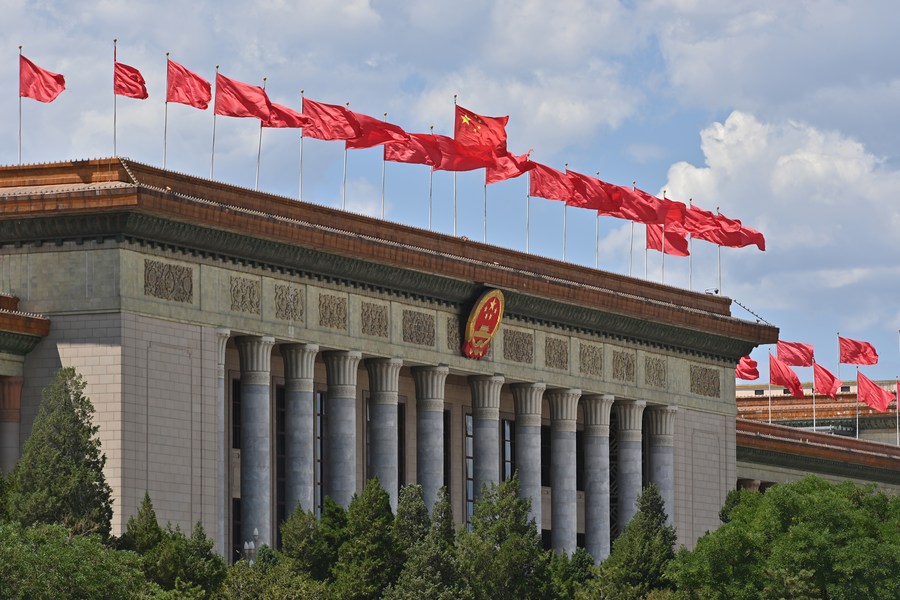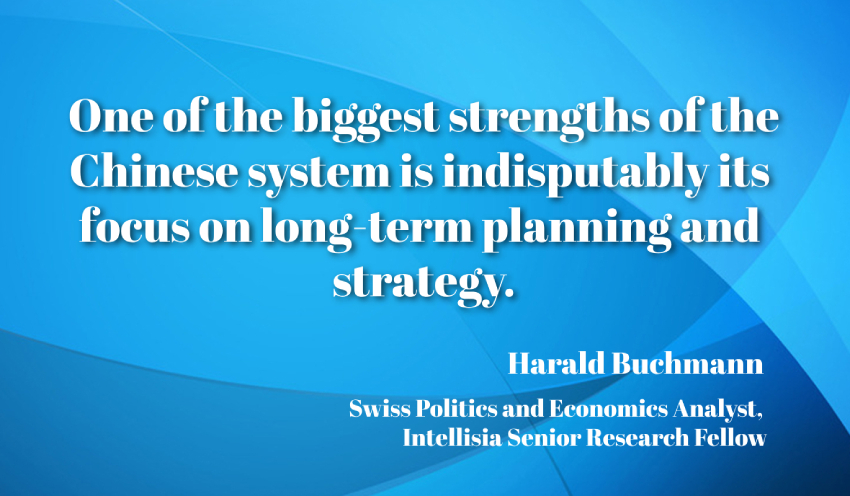


Photo taken on March 4, 2022 shows the Great Hall of the People in Beijing, capital of China. (Photo/Xinhua)
Given the success of the Chinese economic miracle, the popularity of the government among the people, and the general satisfaction with the direction of the country, it is astounding how little attention is paid to the CPC’s approach to governance. The CPC’s top level theory is the guiding principle for concrete policies; local programs seek to implement overarching strategic objectives identified by the central leadership, similar to how local managers in large corporations aim to combine local success with overarching strategic goals. This is the only possibility which can explain, why which so many former CPC targets, goals, and strategic outlines are met and often exceeded, over many decades.
Once we realize that theory does matter, the question becomes: which theory is the most relevant, as CPC theories on governance are vast and complicated. The Xi Jinping Thought on Socialism with Chinese Characteristics for a New Era alone has been articulated in several thick books in original speeches, not to mention the vast body of literature for interpretation and education. Luckily there are a few concepts which stand out and guide virtually all other principles. One of the most important concepts of Socialism in China has been the focus on the so-called Principal Contradiction in Chinese Society (hereafter: PC). This is a macro-level analysis of Chinese society, condensed into one sentence with two sides that are opposite to each other. Marxists will recognize the concept of dialectic materialism which states that dynamic opposing forces drive social change. The PC rarely gets changed, as it addresses the type of major challenge which can only be changed over decades of hard work. But when it gets changed, Chinese would say “it sets higher demand for social innovation of policy development”, which objectively means policy, politics, and society will move in a new direction, although the long- term goal doesn’t change.
A change of direction but no change of goal sounds like an oxymoron in English, where direction and goal are often used interchangeably, but it makes sense if one realizes that the starting position from which the goal is approached has changed. If people think of development as a linear process, all steps between setting a goal and reaching it are in the same direction, at most with some deviation in the speed of change. But life isn’t linear and Chinese are masters in non-linear thinking: one may be approaching a target well on three dimensions, but then some new dimensions start to become increasingly important, which simply hadn’t been relevant in the past. When everyone is poor, inequality isn’t an important issue. But once some people get rich, which is great, financial inequality starts to become increasingly important, or the question whether to focus economic production on improving basic needs or producing luxury goods and how to make that decision etc.
This is perhaps one of the biggest advantages China has over the West: The Chinese system has long-term goals, but it has always been and remains very flexible in the short term, in order to move society towards those goals. Every solution to major problems will inevitably lead to new challenges on new dimensions of analysis. Failure to adapt will only exacerbate those problems. The US is mired in extreme inequality, but the political system allows for politics to make economic changes almost exclusively via interest rates, tax rates, subventions and welfare. None of these tools can address the increasing deindustrialization, the fact that a small group of billionaires control virtually all the media, the increasing poverty in the middle class, or the growth of an impoverished class, to name just a few challenges. What the US did in the past to become the world’s largest superpower doesn’t contain the tools for the new problems that have arisen since.
Compare this to China in 2017, when the most recent “Principal Contradiction” was defined as: “a conflict between unbalanced and inadequate development on the one side and the people’s ever-growing desire for a better life on the other”. Production is not called weak anymore, but rather “unbalanced and inadequate”. The concept of equality is brought back into the highest level of priority by including unbalanced development in the problem side. And the wish of the people side is reworded from simply material and cultural needs to a much more comprehensive need for a better life.
The previous PC definition had almost exclusively focused on economic growth, and many young people in the West have known China only as a super-fast economic growth engine, where almost anything was possible if one just brings in money and/or technology. Because at the time, China lacked both money and technology and had set the goal to change that.
For the very long term, China has two centenary goals, to fully eradicate extreme poverty by 2021 – which has been achieved – and to become a modern, strong socialist country by 2049. Nothing in that long term goal has changed in 2017. But as the facts, the “starting position” have changed, so must the direction to get there. At some point those who were allowed to “get rich first” have to “take the others along with them”. That was always the idea, but now this second part becomes more important.
It quickly becomes evident how spot on the analysis of the PC is for China, and isn’t the same situation even true in the West? The rich are getting richer, GDP growth almost fully goes to the top 10 wealthy (or even just the 1), while the bottom 50 increasingly question the value of GDP growth, as it doesn’t bring them any benefit at all. Furthermore, China’s definition of “balanced” includes not just the balance between rich and poor, but also between man and nature, between present and future generations.
The focus on unbalanced development even works in the international sphere, as the contradiction between the rich developed countries which consume far more resources per capita than the planet can sustain and the poor and poorest countries which need economic growth to feed and educate their people even if it means sacrificing environmental resources and causing pollution.
Getting back to the full definition of the PC, there’s a second half which also has changed to now read “the need of the people for a better life”. This reflects people’s changing demands and expectations after decades of rapid economic growth and also changes in the security environment. When people were extremely poor, bringing factories in, despite ever-so-low salaries, was already an improvement. Nowadays, for example, rich and very well educated young Chinese – many of whom have studied or traveled abroad – compare their circumstances to the best conditions the US and Europe have to offer to rich people. The successful eradication of absolute poverty means nobody worries about food and shelter anymore. Therefore, many other aspects like good education, culture and entertainment, clean air and water, beautiful cities with green parks are seen as increasingly important for the people.
In fact, this new PC is so obviously true that one must ask if it isn’t a truism: is the PC a statement which is so general and so vague that there’s no circumstance in which it isn’t correct? But indeed, it isn’t - because when we think of countries at a development stage like China 20, 30 or 50 years ago, like India, some countries in Africa, or Afghanistan, it would be wrong for them to focus on equality and inclusiveness right now. When people are hungry, it’s almost cruel to talk to them about environmentalism. When mothers don’t know how to feed their kids, their most urgent need is food, not gender definitions.

One of the biggest strengths of the Chinese system is indisputably its focus on long-term planning and strategy. But it’s important to realize that this long-term thinking also entails a stark realism about what is currently possible, a very strict prioritization of the overall direction, while maximizing responsiveness for local level leadership to local needs and capabilities in a reasonable manner. In the long term, any society can build a really beautiful place on earth, but to demand that everything be made perfect instantly, is blind utopism and often achieves the contrary of what’s intended. The Chinese concentration on the PC helps a party of 90 million individual members provide guidance to 1.4 billion people.
The long-term goal is building China into a modern socialist country that is prosperous, strong, democratic, culturally advanced, harmonious and beautiful by 2049. But such an ambitious goal set for such a long time span can hardly guide decision-makers at all levels during their daily work. To have the focus on the PC is one tool for breaking the long- term goal down into “digestible pieces”, before concrete short-term measures, plans, tactics, and targets are derived.
If one hopes to understand changes in Chinese politics over the recent five years and many years to come, researching the PC can be a good start. This requires China watchers and China experts to drop their blinders regarding CPC theory and admit that China’s development and success didn’t just “happen” as a “coincidence” or simple consequence of diligent people. Many countries have diligent and intelligent citizens in large numbers, but only China has the theoretical and practical framework developed and implemented by the Communist Party of China.
Contributed by Harald Buchmann, Swiss Politics and Economics Analyst, Intellisia Senior Research Fellow

点击右上角![]() 微信好友
微信好友
 朋友圈
朋友圈

请使用浏览器分享功能进行分享
